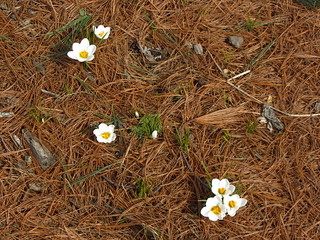
I'm a writer, publishing both as SJ Rozan and, with Carlos Dews, as Sam Cabot. (I'm Sam, he's Cabot.) Here you can find links to my almost-daily blog posts, including the Saturday haiku I've been doing for years. BUT the blog itself has moved to my website. If you go on over there you can subscribe and you'll never miss a post. (Miss a post! A scary thought!) Also, I'll be teaching a writing workshop in Italy this summer -- come join us!
Read/Post Comments (5)

Haiku
JL asks about haiku, whether in Japanese it's characters as opposed to syllables. Thought this was interesting enough to do a post on.
It's syllables in Japanese, too. The rules for haiku as an independent form were laid out in the late 1890's; it developed from a form in which an introductory 5-7-5 syllable verse, called hokku, set the tone for a connected cycle of poems. The rules are only 2 (and I've been known to break them). One, the poem must be in two "idea" sections, preferrably broken at the end of a line as opposed to the middle of one; that is, first line, then second and third, (Mallard vanguard's here...) or first and second, then third (In north-side tree pits...). Two, the poem must contain a word indicating the season. I often stretch this to mean "weather." And, as I say, I break both rules sometimes. For example:
2 ideas, but broken in middle of the third line:
Coconuts, grapefruits,
Flat-roofed bungalows, condos,
Highway. Endless sea.
No 'season' word:
Trucks: Airborne Express
Fed Ex, UPS, and mail.
So where's my teapot?
Single idea:
Black barge, red tug, red
cargo, yellow ferry, white
yacht, silver river.
In translating haiku, people usually opt for precision of meaning over perfection of form, which is why translations from the Japanese often have the wrong number of syllables in English.
It's syllables in Japanese, too. The rules for haiku as an independent form were laid out in the late 1890's; it developed from a form in which an introductory 5-7-5 syllable verse, called hokku, set the tone for a connected cycle of poems. The rules are only 2 (and I've been known to break them). One, the poem must be in two "idea" sections, preferrably broken at the end of a line as opposed to the middle of one; that is, first line, then second and third, (Mallard vanguard's here...) or first and second, then third (In north-side tree pits...). Two, the poem must contain a word indicating the season. I often stretch this to mean "weather." And, as I say, I break both rules sometimes. For example:
2 ideas, but broken in middle of the third line:
Coconuts, grapefruits,
Flat-roofed bungalows, condos,
Highway. Endless sea.
No 'season' word:
Trucks: Airborne Express
Fed Ex, UPS, and mail.
So where's my teapot?
Single idea:
Black barge, red tug, red
cargo, yellow ferry, white
yacht, silver river.
In translating haiku, people usually opt for precision of meaning over perfection of form, which is why translations from the Japanese often have the wrong number of syllables in English.
Read/Post Comments (5)
Previous Entry :: Next Entry
Back to Top